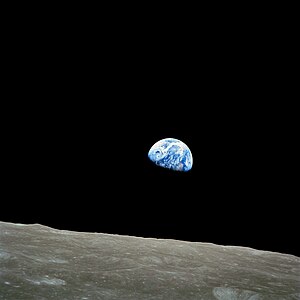Earth (Vasarden): Difference between revisions
Jump to navigation
Jump to search
(Created page with "<!-- some content, primarily in-depth scientific data within the infobox, taken from Earth on Wikipedia, . --> {{WIP}} {{about|the planet in Vasarden|o...") |
No edit summary |
||
| Line 6: | Line 6: | ||
| background = #f8f9fa | | background = #f8f9fa | ||
| name = Earth | | name = Earth | ||
| alt_names = | | alt_names = (the) World<br><small>{{wpl|German language|Vierz}}:</small>Erde, Welt<br><small>{{wpl|Spanish language|Tieradan}}:</small> Tierra, Mundo | ||
| adjectives = | | adjectives = | ||
| symbol = | | symbol = | ||
Revision as of 23:47, 30 April 2020
This article is incomplete because it is pending further input from participants, or it is a work-in-progress by one author. Please comment on this article's talk page to share your input, comments and questions. Note: To contribute to this article, you may need to seek help from the author(s) of this page. |
 Earth, as seen from the lunar orbiter Esperanza | |||||||||||||||||
| Designations | |||||||||||||||||
|---|---|---|---|---|---|---|---|---|---|---|---|---|---|---|---|---|---|
| (the) World Vierz:Erde, Welt Tieradan: Tierra, Mundo | |||||||||||||||||
| Orbital characteristics | |||||||||||||||||
| 365 d | |||||||||||||||||
Average orbital speed | 30 km/s | ||||||||||||||||
| Known satellites | TBD | ||||||||||||||||
| Physical characteristics | |||||||||||||||||
| Volume | TBD | ||||||||||||||||
| Mass | TBD | ||||||||||||||||
Mean density | TBD | ||||||||||||||||
| 9.80665 m/s2 (1 g; 32.1740 ft/s2) | |||||||||||||||||
Equatorial rotation velocity | TBD | ||||||||||||||||
| 23.44° | |||||||||||||||||
| |||||||||||||||||
| Atmosphere | |||||||||||||||||
| Composition by volume | TBD | ||||||||||||||||
Earth is the TBDth planet from the sun and the only astronomic object known to be inhabited. It is a rocky planet whose surface is covered significantly by water, comprising roughly 70% of the Earth's surface; land comprises the remaining 30% of the Earth's surface. The widespread presence of liquid water is one of a number of unique factors that facilitate the continual widespread presence of life on Earth, which varies significantly from region to region as a result of differences in climate. Earth notably harbors the species Homo Sapiens, the foremost known sentient lifeform.